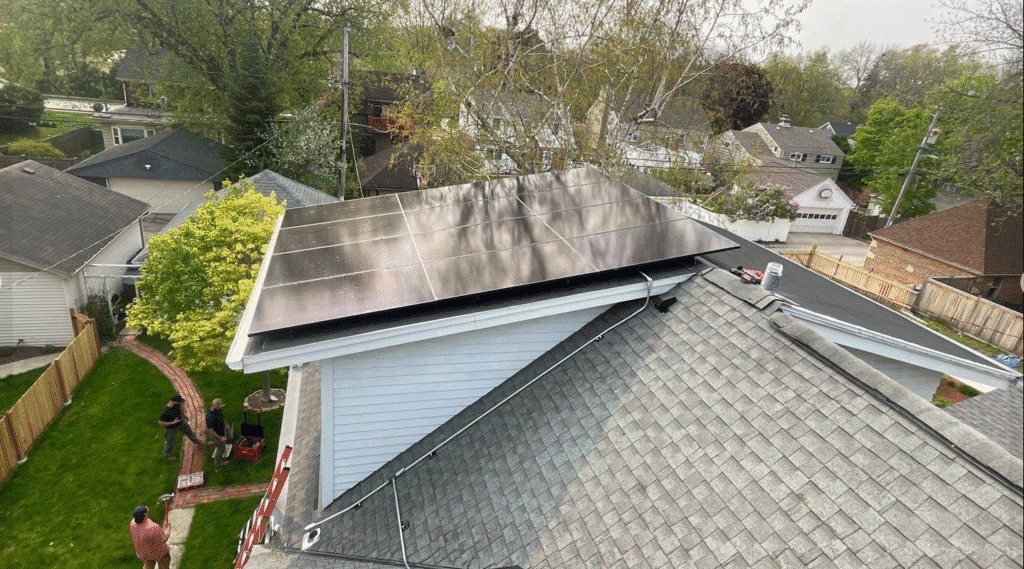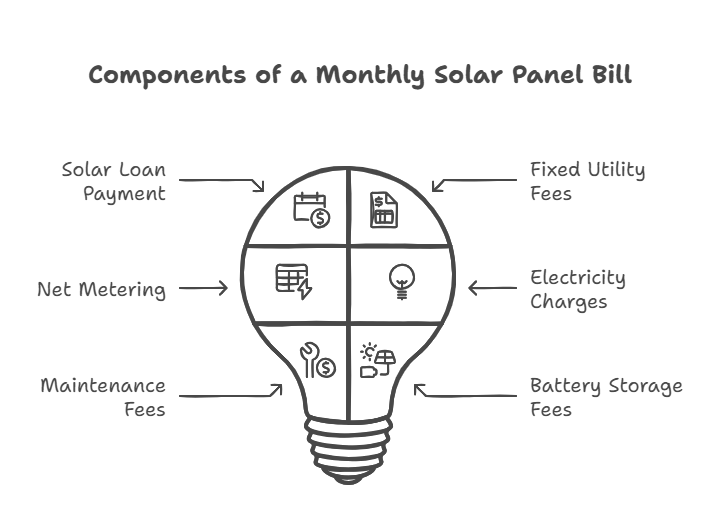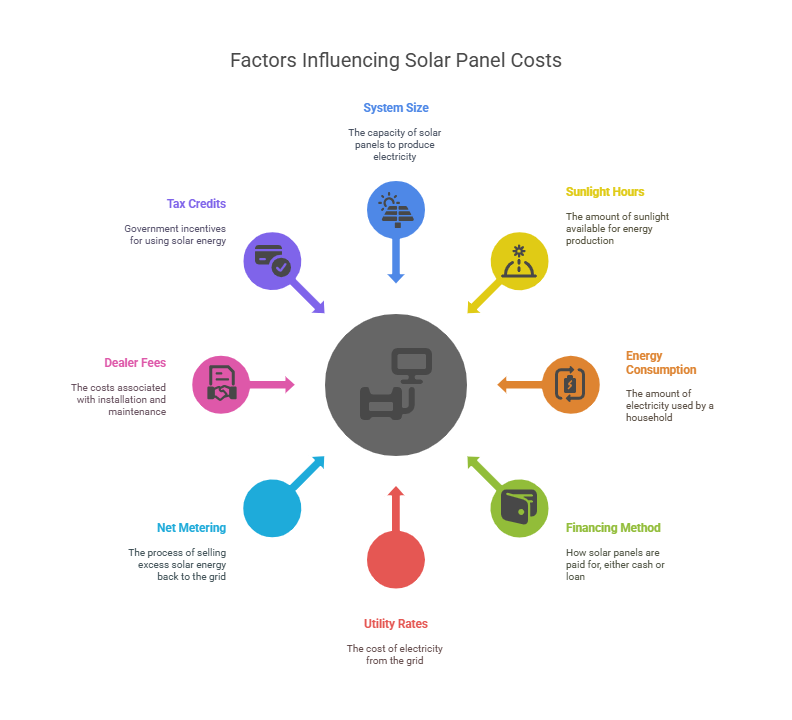Homeowners use solar panels to reduce their monthly energy bills while promoting clean energy use. Traditional energy bills are replaced with a new billing structure, commonly known as a Monthly Bill for Solar Panels.
The bills mean financing the solar system, as opposed to the monthly electric bill. The bills will be calculated for depreciation, utility charges, solar loan payments, or lease fees. On average, the monthly bill for solar panels is between $164 and $229.
However, the bill will change depending on system capacity or size, sunlight availability, local utility rates, net metering or billing policies, interest rates, dealer fees, installation costs, and whether the system is financed or paid in cash.
What is the average Monthly Bill for Solar Panels?
The average monthly loan payment for a 7.1-7.7 kW system is between $141 to $229, with quotes ranging from $164 and $229. This is for 25-year loans at 4.99-6.99% APR. For example, the average loan payment will be from $141 to $165 for a 7.5 kW system. But with the dealer fee and longer loan terms, it can go up to $229 or more. The cost will vary depending on the location, tax credits, and lender fees.
For example, a properly sized solar system with a 7.4-7.5 kw system capacity and 5 hours of direct daily sunlight can easily offset an average U.S. household’s electricity consumption. It will reduce the electric bill to zero. However, if the system is not sufficient, the cost will be higher since you have to pay monthly energy bills.

Components of a Monthly Solar Panel Bill

Solar Loan Payment (If Financed)
If you install the solar panel through a loan, you need to pay the principal and interest every month. The monthly loan payment is fixed. However, the amount will depend on the system cost, interest cost, and loan duration.
Fixed Utility Fees
Most solar panels installed in the household are not sufficient to supply the entire power demand. You need backup sometimes for emergencies. That’s why even with solar panels, homeowners need to pay the utility bills for backup. You need to pay a minimum fee regardless of whether you use it or not. learn how solar heating is used in a household.
Net Metering
Sometimes, you produce more than you need through the solar panel. That energy goes to the grid. Net metering allows you to earn credits for that extra electricity. It will offset the cost of the regular electricity bill when your solar production is low. Credits can significantly lower your utility bills.
Electricity Charges
Low sunlight or other reasons can reduce your energy production. If the solar panel fail to produce sufficient electricity for your home, you need to pay grid electricity bills based on the utility rate. These bills depend on the use and vary from area to area.
Maintenance or Monitoring Fees
Solar panels need maintenance. Yes, you don’t need to perform regular maintenance. However, regular maintenance is important to ensure efficiency. You need to clean it, track performance, and make repairs for components like inverters. It will cost very little. Some companies even offer free maintenance.
Battery Storage Fees
You need solar battery storage systems that will incur additional costs, such as lease payments or loans, maintenance, or service fees. However, not all solar systems include batteries. So this is an optional component for the monthly bill.
Factors affecting the monthly bill for solar panels

System Size
The solar panel size (in kW) affects the electricity production capacity. Larger systems will produce more power and reduce the cost of electricity for the grid. However, you need to pay more for upfront installation costs and pay a higher monthly loan fee. On the other hand, a smaller system will decrease the upfront cost, but it will increase the energy bills if it cannot meet the energy needs. To calculate your savings, use our solar savings cost calculator.
Sunlight Hours and Geographic Location
The solar panel produces electricity from the sunlight. That means if the system cannot get enough sunlight, it cannot produce enough power for your home. You must use grid power to meet your electricity demand. That’s why sunlight hours and geographic location impact the monthly bill for solar panels.
Household Energy Consumption
Households with higher energy needs will have to pay more for their monthly bills for solar panels. They will either need larger systems to generate enough power or pay grid electricity bills to meet their extra demand. Low-consumption homes can minimize the grid costs and save money with solar panels.
Financing Method (Loan vs. Cash)
The financing method impacts the monthly solar panel bills a lot. If you are installing the system with your cash, you are paying a lot of cash upfront. However, it saves you from interest. On the other hand, a loan or lease will involve a fixed monthly payment.
Utility Rates and Policies
Local utility rates for grid electricity also impact the monthly bill. Some areas have higher utility rates than others do. Restrictive policies like TOU rates can lower your savings if the solar production is lower during peak hours.
Net Metering or Billing Structure
When you have extra solar energy production, it will be sent to the grid, reducing your cost of electricity when production is low. Higher net metering will lower the monthly cost.
Dealer or Installer Fees
The installation fees, maintenance fees, and administrative services fees will impact the solar panel bills. Systems without such fees will reduce the monthly bills. However, homeowners might need to perform those activities.
Available Tax Credits and Incentives
Government, federal, state, or local authorities often offer tax credits and incentives for using clean energy, like solar panels. It will decrease the monthly payment.
Do you get charged for having solar panels?
No, you don’t get charged for having solar panels. However, there are some connection fees, maintenance costs, and state-specific Customer Benefit Contribution (CBC) charges.
How can the monthly bill for solar panels be reduced?
Choose the Right System Size for Your Energy Needs
Always pick a solar panel system size that matches your household’s energy demand. The demand is measured in kilowatts (kw). Check the last 12 months of your utility demands and calculate the average. Now, pick a solar system that can cover that demand. An oversized system will incur more upfront cost, and a smaller-sized system will incur higher grid electricity bills.
Shop Around for Competitive Financing Rates
Always get quotes from multiple lenders or solar providers to secure lower interest rates. Compare them and find the lowest one.
Take Advantage of Tax Credits and Local Incentives
Local, federal, and state governments provide incentives and tax rebates. Check your local policies and take advantage of tax credits. It will reduce the upfront cost of installing the system.
Improve Home Energy Efficiency to Reduce Consumption
Try to lower the energy consumption of your home by using daylight and natural wind. It will allow the solar system to cover your regular energy needs. Consequently, you don’t have to use grid energy, leading to lower monthly energy bills.
Avoid Unnecessary Dealer or Installer Markups
Some solar dealer keeps charging you for regular maintenance. Try to avoid such a dealer and always go for a dealer offering free maintenance. Compare quotes and offers from different dealers and pick the best one.
Consider Longer Loan Terms for Lower Monthly Payments
If you have to take a loan, go for longer loan terms. It will reduce the monthly payment. However, the loan is always difficult. It is always better to use cash for such an installation.
Maintain and Clean Panels Regularly for Maximum Output
Perform regular maintenance and keep your solar panels in shape for maximum output. Clean the panel and inspect components like inverters for peak efficiency. Dust, debris, and shading can reduce sunlight absorption for the panels.
Optimize System Placement for Sun Exposure
Install the solar panels in the proper place so they can get maximum sunlight exposure to generate maximum power for your home. Reduce any obstacles blocking the sunlight.
Use Energy During Daylight Hours to Maximize Direct Solar Usage
Always perform energy-intensive tasks during daylight hours to use solar energy directly as it’s produced. You can run heavy appliances or charge electric vehicles during the day.
Is solar energy a good or bad thing to buy?
It is a good thing to buy if you can afford it. The system will reduce your grid energy cost and ensure clean energy consumption. You will have an impact on building a green and carbon-free world. However, the upfront cost is a bit higher. So, consider that before installing.
How does the solar heating system work?
The solar system converts the sunlight energy into usable electricity with its panels and converter. There are storage batteries to store the power to use when the sun goes down.
FAQs
Do I still need to pay an electric bill after installing solar panels?
Yes, you may need to pay the electric bill even after installing solar panels. This is because you need to connect utility grid for backup power.
Is it possible that my monthly solar bill could be higher than my old electric bills?
Yes, it is possible, especially if your solar system is undersized or if you consume more energy than expected. So, calculate the cost before installing a solar panel.
What happens if my solar system produces more electricity than I use?
You may earn credit for extra energy produced by your solar panels through net metering
Will I save more money if I buy my solar panels with cash?
Yes, you will save the interest money.
